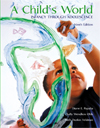 |  A Child's World: Infancy through Adolescence, 9/e Diane E. Papalia,
University of Wisconsin-Madison
Sally Wendkos Olds
Ruth Duskin Feldman
A Child's World: How We Discover It
Chapter Outline
Section I Basic Theoretical Issues
Issue 1: Which is More Important - Heredity or Environment?
Issue 2: Are Children Active or Passive in Their Development?
Issue 3: Is Development Continuous, or Does It Occur in Stages?
An Emerging Consensus |
 |  |  | Section II Theoretical Perspectives
Perspective 1: PsychoanalyticSigmund Freud: Psychosexual DevelopmentErik Erikson: Psychosocial Development
Perspective 2: LearningLearning Theory 1: BehaviorismLearning Theory 2: Social Learning (Social Cognitive) Theory
Perspective 3: CognitiveJean Piaget's Cognitive-Stage TheoryThe Information-Processing ApproachNeo-Piagetian TheoriesThe Cognitive Neuroscience Approach
Perspective 4: Ethological
Perspective 5: ContextualUrie Bronfenbrenner's Bioecological TheoryLev Vygotsky's Sociocultural Theory
How Theory and Research Work Together |
 |  |  | Section III Research Methods
Sampling
Forms of Data CollectionSelf-Reports: Diaries, Interviews, QuestionnairesBehavioral and Performance MeasuresNaturalistic and Laboratory Observation
Basic Research DesignsCase StudiesEthnographic StudiesCorrelational StudiesExperiments
Developmental Research DesignsLongitudinal, Cross-Sectional, and Sequential StudiesMicrogentic Studies
Ethics of Research |
|



 2002 McGraw-Hill Higher Education
2002 McGraw-Hill Higher Education